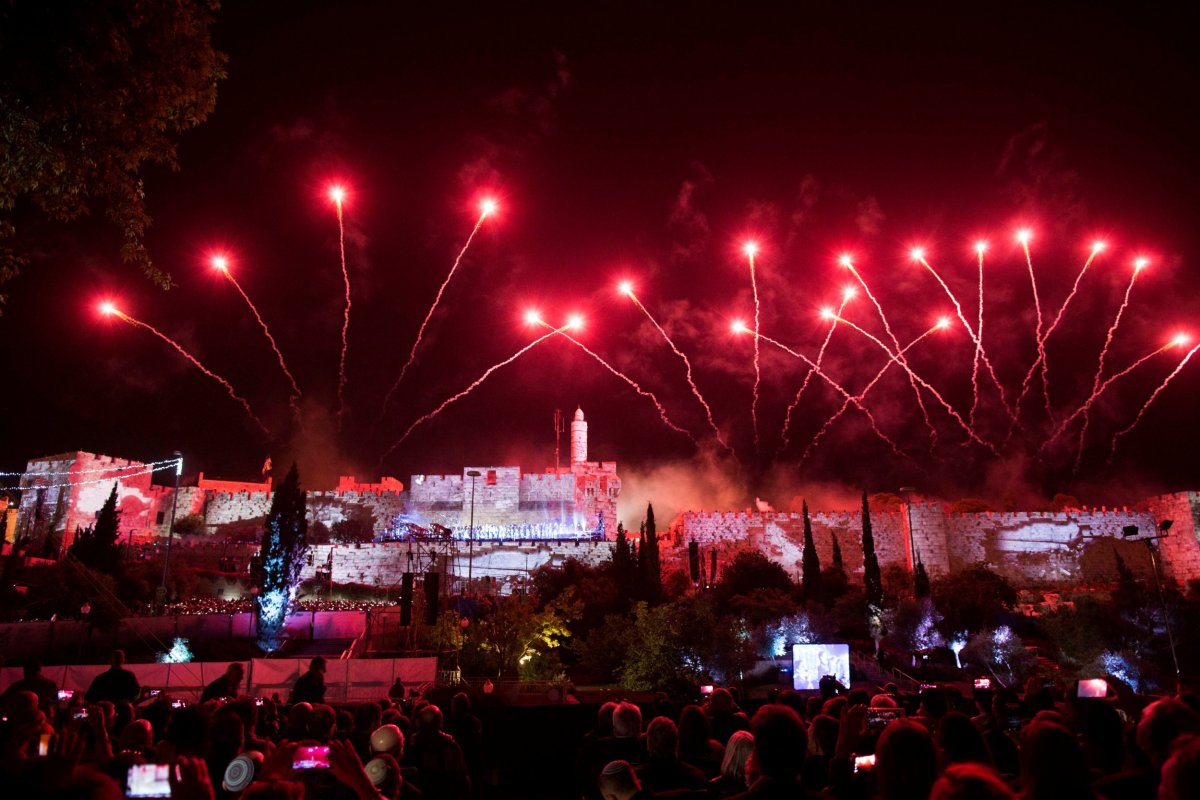
At dawn on June 5, 1967, hundreds of Egyptian jets penetrated Israeli airspace. Israeli pilots scrambled, but too late; their planes were destroyed on the ground. Simultaneously, Egyptian armored columns broke through Israel's southern defences and within hours rolled through Beersheva.
Elsewhere, in Jerusalem, Jordanian troops surrounded the western half of the city, cutting off its Jewish population, and began advancing toward Tel Aviv. Syrian forces descended from the Golan Heights, took Tiberias, and marched on Haifa. The armies of several other Arab states also participated, overwhelming the Israelis who, outnumbered and outgunned, surrendered.
Six days later, the war was over. Much of the Jewish state lay in ruins and untold numbers of its population—uniformed and civilian—were dead. Many of the survivors struggled to evacuate on U.S. Navy ships that the occupiers allowed to approach the coast. Radios throughout the region broadcast Egyptian President Gamal Abdel Nasser's declaration of victory over Zionism and the total liberation of Palestine.
The international community, meanwhile, remained passive. There was no need for the Security Council to demand a ceasefire or to establish the principle of territory-for-peace. Arab armies ruled all the territory and eliminated any need for peace. Churches and synagogues across the United States held memorial ceremonies while the Soviets, the Arabs' main military backers, paraded through Red Square.
Everywhere in the Middle East—in Baghdad, Damascus, and Beirut—millions took to the streets in celebration and calling for death to the West.
The putative winners of the war were the Palestinian refugees from Israel's creation nineteen years earlier. Nasser permitted them to return to deserted Israeli towns. But there they found themselves under a military occupation similar to Egypt's in Gaza or a harsh civilian administration such as Jordan's in the West Bank. Egypt quickly annexed the Negev desert, Jordan claimed Jerusalem, and Syria absorbed the Galilee. The small corridor that remained was placed under the Palestinian Liberation Organization, an Egyptian front group erected by Nasser three years earlier. Its rival, the al-Fatah movement led by Yasser Arafat, was crushed.

For the United States, in particular, Israel's destruction had long-term repercussions. Emboldened, the Soviet Union sparked anti-American uprisings in Africa, Latin America, and the Far East, indefinitely prolonging the Cold War. Already strained by the Vietnam conflict, U.S. forces had to be diverted to Lebanon, Saudi Arabia, and other friendly Arab countries to protect them from overthrow by Nasserist revolts. China, which was also allied with Arab radicals, stepped up its operations in Southeast Asia, threatening South Korea and Japan.
Among the hardest-hit casualties of the Six-Day War were the Jews outside of Israel. The American Jewish community, still traumatized by the Holocaust, Israel's defeat was thoroughly demoralizing. For the three million Jews languishing under Soviet oppression, though, the despair was even deeper. Having looked to the Jewish State for the inspiration and courage to demand their freedom, Soviet Jews now resigned themselves to eventual extinction.
No peace process, no U.S.-Israel alliance, no resurgence of Jewish identity, and no hope for Soviet Jews—these are just several of the possible consequences of the Six-Day War had its outcome been different.
Fortunately, it was Israel's air force that destroyed Egypt's and Israeli troops that captured the Sinai Peninsula. Jordan and Syria did attack Israel but were quickly driven from the West Bank, Jerusalem, and the Golan Heights. Yet none of those scenarios were foreseen by Israeli leaders before the war. On the contrary, they braced for disaster.
Recalling Nasser's use of gas against his enemies in Yemen, Israel distributed gas masks to its civilian population and dug 10,000 graves for the expected casualties. Israeli Prime Minister Levi Eshkol secretly urged Arab rulers not to fight and waited three nerve-wracking weeks while U.S. President Lyndon Johnson tried, unsuccessfully, to mediate.
Even after Israel's remarkable victory the government voted to return most of the captured territory in return for treaties with Egypt and Syria. Palestinian notables were asked to set up an autonomous West Bank entity. All these overtures were rejected. Still, Israel supported UN Resolution 242, enacted that November, and its concept of territory-for-peace.
That resolution served as the basis of the Egypt-Israel peace treaty which, in turn, led to reconciliation between Israel and Jordan. Today, fifty years after the war, most Arab leaders accept Israel's existence and even view it as a bulwark against Iran. Because of the Six-Day War, the Syrian civil war rages far from the eastern shore of the Sea of Galilee, the border before 1967. An Israel strengthened strategically and economically by the war serves as a democratic, pro-American anchor in a still-chaotic Middle East.
The war's positive results did not, however, include a resolution of Israel's dispute with the Palestinians. Their leaders continue to deny the legitimacy and permanence of the Jewish state—the very cause of the Six-Day War. Yet they, too, can benefit from the opportunities for Palestinian self-determination created in 1967. By acknowledging the reasons for the war and its outcome, they can relinquish alternative realities and reach a genuine peace.
Michael B. Oren is Israel's Deputy Minister of Diplomacy in the Prime Minister's Office and the author of Six Days of War: June, 1967 and the Making of the Modern Middle East [Random House, 2017]
Uncommon Knowledge
Newsweek is committed to challenging conventional wisdom and finding connections in the search for common ground.
Newsweek is committed to challenging conventional wisdom and finding connections in the search for common ground.
About the writer
To read how Newsweek uses AI as a newsroom tool, Click here.








